It's been 10 days and they've flown by! Half way through my stay here.
Noah has been all absorbing, great fun. He is learning fast and is engaging. He is really showing some of his character as it's not just eat and sleep these days. He is active and inquiring as he explores, and pushes boundaries. I am loving being grandpa but I have also enjoyed getting out and about.
After several boat trips and game drives I feel more confident on bird names and calls. Akagera has some 480 species and so far this trip I can only identify less than 100 with help!
The Park is drying up a bit at this time of year and early burning is due to start soon to avoid those later, hot fires. We did a 12 hour game drive to the north and back the other day and saw everything from elephant shrews to giraffe, eland, roan, topi and even an elephant. It was hot and dusty and very bumpy. Today I did the same trip in a helicopter in only an hour and we went further. It was stunning to fly low, around a small herd of elephant, skim over the backs of a herd of buffalo and slow to count giraffe before climbing out of the low plains and slip over the rocky ridges. The countless lakes, papyrus beds and plains and rolling hills with their own specific vegetation types, just left me speechless. I had no door and at times did not know where to point the camera, through my feet almost, or on the simmering hazy horizon.
With just 10 days to go until Malawi, I have many little jobs around the house I promised to do and as yet, they remain unstarted.
Photos to follow
Musings from Malawi
Monday, July 09, 2012
Tuesday, June 26, 2012
Sydney
The last few weeks have been different as I prepared to leave home and country. I know I have felt a little numb, a little subdued even. It's as though I'm on a conveyor belt of time facing the inevitable drop off point from which I fall into a new time zone beyond which I could not easily imagine what lay ahead. My future looked like a series of imagined pictures and places and of plans that were hard to visualise.
There is both the excitement of facing uncertainty and regret at leaving the security of the known. People asked, "Are you excited?" and yes, to some extent I was excited, but with caution and just a twinge of sadness at leaving the familiar.
Arriving to stay with my brother in Sydney in the middle of a photo shoot for his summer catalog was a great distraction. www.jasminehall.com.au have a great range of bed linen, cushions, throws and bed covers etc.

The fight out is tomorrow. Now I'm excited. These few days in Sydney with family has been wonderful but it's time to go!
There is both the excitement of facing uncertainty and regret at leaving the security of the known. People asked, "Are you excited?" and yes, to some extent I was excited, but with caution and just a twinge of sadness at leaving the familiar.
Arriving to stay with my brother in Sydney in the middle of a photo shoot for his summer catalog was a great distraction. www.jasminehall.com.au have a great range of bed linen, cushions, throws and bed covers etc.
The fight out is tomorrow. Now I'm excited. These few days in Sydney with family has been wonderful but it's time to go!
Monday, June 18, 2012
Tiramisu
On the eve of my departure, a practice blog while eating Tiramisu with Vanessa and Alison. Thanks for suggesting I restart my old blog. It will certainly be a way of disseminating news.
Watch this space, as they say......
Wednesday, March 22, 2006
Private Sector Partnerships Officer
This is the role, Private Sector Partnerships Officer, it's a fundraising one which is going to keep me busy.
Unfortunately I've been asked not to continue the Weblog. I'm an employee of WFP I guess they'd rather have some control over what employees publish about their work. I understand and shall look at other ways of disseminating information about what I do and what I care about.
In the meantime keep abreast of issues in Malawi by following the links provided. In particular look at:-
http://www.fighthunger.org/home
-I shall be organising a Walk the World event here in Malawi, so stay tuned, contibute or organise one yourself.
(I'll be posting my personal news up to another weblog soon, so please come back and take details when it's done).
Unfortunately I've been asked not to continue the Weblog. I'm an employee of WFP I guess they'd rather have some control over what employees publish about their work. I understand and shall look at other ways of disseminating information about what I do and what I care about.
In the meantime keep abreast of issues in Malawi by following the links provided. In particular look at:-
http://www.fighthunger.org/home
-I shall be organising a Walk the World event here in Malawi, so stay tuned, contibute or organise one yourself.
(I'll be posting my personal news up to another weblog soon, so please come back and take details when it's done).
Saturday, February 25, 2006
Better News
I've been reading news articles and reports from Malawi. It seems as though Malawi is in for a better than average harvest. Food should be more available towards the middle of the year.
Read- http://www.wfp.org/english/?ModuleID=137&Key=2003
"The generosity shown by donors to support the people of Malawi has been overwhelming
James T. Morris, the UN Secretary-General’s Special Envoy for Humanitarian Needs in Southern AfricaAfter a two-day visit to the country, Morris said that recent good rainfall could mean Malawi has a good harvest this year and as a result, for the first time in four years, could turn its full attention to medium-term and longer-term humanitarian projects rather than only focusing on immediate needs. "
This article gives a good overview of what the World Food Programme is doing to satisfy those immediate needs.
http://www.wfp.org/country_brief/indexcountry.asp?country=454
I leave on the 28th of February and arrive on Martyrs day*, March the 3rd. It'll be exactly 6 months since I arrived back in Australia and started working out how to get back to Malawi.
*Martyrs day, March 3rd 1959, 12 protesters were killed as they marched on Police escorting prisoners onto the MV Ilala at Nkata Bay. In recent years I have met 3 officials (expatriate and native Malawian) who were there that dreadful day, each with their own story. I wish I'd recorded them.
Read- http://www.wfp.org/english/?ModuleID=137&Key=2003
"The generosity shown by donors to support the people of Malawi has been overwhelming
James T. Morris, the UN Secretary-General’s Special Envoy for Humanitarian Needs in Southern AfricaAfter a two-day visit to the country, Morris said that recent good rainfall could mean Malawi has a good harvest this year and as a result, for the first time in four years, could turn its full attention to medium-term and longer-term humanitarian projects rather than only focusing on immediate needs. "
This article gives a good overview of what the World Food Programme is doing to satisfy those immediate needs.
http://www.wfp.org/country_brief/indexcountry.asp?country=454
I leave on the 28th of February and arrive on Martyrs day*, March the 3rd. It'll be exactly 6 months since I arrived back in Australia and started working out how to get back to Malawi.
*Martyrs day, March 3rd 1959, 12 protesters were killed as they marched on Police escorting prisoners onto the MV Ilala at Nkata Bay. In recent years I have met 3 officials (expatriate and native Malawian) who were there that dreadful day, each with their own story. I wish I'd recorded them.
Wednesday, February 15, 2006
The Maleri Iles - Senga bay
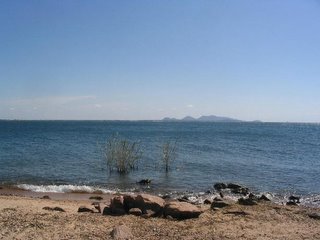
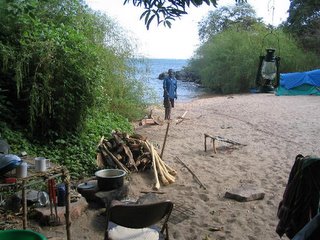 These Islands are part of Lake Malawi National Park (World Heritage listed, see link below). Conservation of these amazing islands has been difficult. A friend of mine has taken a concession over them in an effort to preserve these unique islands (some Cyclids are only found here, nowhere else in the world!). Fishermen from all over the lake have been using them as a camping ground , a 'half-way house' where they could dry and smoke their catch. The result has been a disaster to the island environment with much of the timber removed.
These Islands are part of Lake Malawi National Park (World Heritage listed, see link below). Conservation of these amazing islands has been difficult. A friend of mine has taken a concession over them in an effort to preserve these unique islands (some Cyclids are only found here, nowhere else in the world!). Fishermen from all over the lake have been using them as a camping ground , a 'half-way house' where they could dry and smoke their catch. The result has been a disaster to the island environment with much of the timber removed.I camped here on behalf of my friend for 2 months, under a fig tree. My task was to assist the newly appointed Dept of Parks and Wildlife Scout
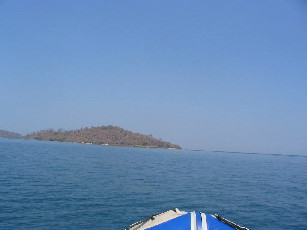
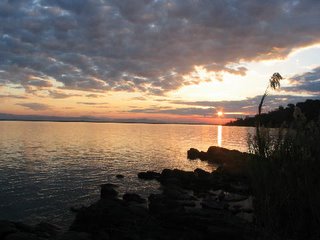 s and to manage six labourers clear and develop a campsite for tourists. I also tried to talk to the hostile, displaced fishermen who in many cases came from as far afield as Likoma where fish stocks are already virtually depleted. They now camped on the mainland and paddled past most evenings.
s and to manage six labourers clear and develop a campsite for tourists. I also tried to talk to the hostile, displaced fishermen who in many cases came from as far afield as Likoma where fish stocks are already virtually depleted. They now camped on the mainland and paddled past most evenings.It has become quite evident that without tighter control, fish stocks throughout the lake will be severely reduced. There is no doubt in my mind that the size of catches are smaller as is the size of what people think is a big fish! My childhood memories are of huge Chambo, easily caught. This is no longer the case.
Aquaculture and retraining of fishermen is the only answer to work towards a sustainable future. Someone go for it - make a project of it in Senga Bay! I'll help write it up if I can.
http://whc.unesco.org/pg.cfm?cid=31&id_site=289
Nyika 2005
The Nyika Plateau in the North of Malawi is a stunning landscape. At 7500 ft above sea level it can be a cold and wet, soggy environment. However it feels like one's closer to heaven and on top of the world on a sunny day! The massif acts like a sponge, and is the source of the magnificent Lake Malawi.
I was there for 3 months assisting with Nyika Vwaza Trust, whose mandate is to conserve this amazing plateau before it's too late.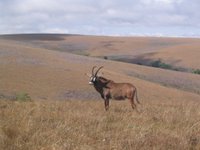
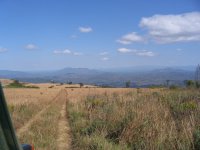
One of the main problems is the late season, hot fires started by poachers. Another is spread of exotic weeds, namely the Carribian pines planted in the '50s as an experiment.
The Nyika Vwaza Trust can be contacted though http://www.nyika.com/
I was there for 3 months assisting with Nyika Vwaza Trust, whose mandate is to conserve this amazing plateau before it's too late.


One of the main problems is the late season, hot fires started by poachers. Another is spread of exotic weeds, namely the Carribian pines planted in the '50s as an experiment.
The Nyika Vwaza Trust can be contacted though http://www.nyika.com/
Practice Posting
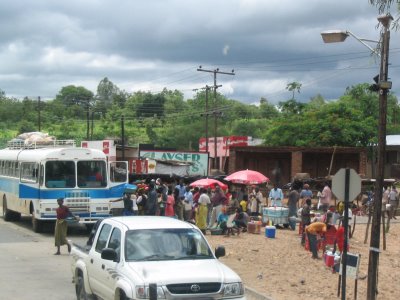
A typical roadside scene, somewhere in the south.
The rainy season is December to February. In 2005 the rains stopped half way through January. Malawi only produced 1.3 million metric tons of maize (the staple food) intstead of the 2 million needed to feed the nation.
In Jan 2005 a family of 6 needed $115US per month for basics. In Jan 2006 this had risen to $185US
Malawi Briefly
Established in 1891, the British protectorate of Nyasaland became the independent nation of Malawi in 1964. After three decades of one-party rule under President Hastings Kamuzu BANDA the country held multiparty elections in 1994, under a provisional constitution, which came into full effect the following year. Current President Bingu wa MUTHARIKA, elected in May 2004 after the previous president failed to amend the constitution to permit another term, has struggled to assert his authority against his predecessor, who still leads the UNITED DEMOCRATIC FRONT (UDF) party. MUTHARIKA as President resigned from the UDF and formed his own party.
Landlocked Malawi ranks among the world's least developed countries. The economy is predominately agricultural, with about 90% of the population living in rural areas. Agriculture accounted for nearly 36% of GDP and 80% of export revenues in 2005. The performance of the tobacco sector is key to short-term growth as tobacco accounts for over 50% of exports. The economy depends on substantial inflows of economic assistance from the IMF, the World Bank, and individual donor nations. In late 2000, Malawi was approved for relief under the Heavily Indebted Poor Countries (HIPC) program. The government faces strong challenges, including developing a market economy, improving educational facilities, facing up to environmental problems, dealing with the rapidly growing problem of HIV/AIDS, and satisfying foreign donors that fiscal discipline is being tightened. In 2005, President MUTHARIKA championed an anticorruption campaign. Malawi's recent fiscal policy performance has been very strong, but a serious drought in 2005 and 2006 has increased pressure on government spending.
Courtesy of -
http://www.cia.gov/cia/publications/factbook/geos/mi.html -just slightly edited
Landlocked Malawi ranks among the world's least developed countries. The economy is predominately agricultural, with about 90% of the population living in rural areas. Agriculture accounted for nearly 36% of GDP and 80% of export revenues in 2005. The performance of the tobacco sector is key to short-term growth as tobacco accounts for over 50% of exports. The economy depends on substantial inflows of economic assistance from the IMF, the World Bank, and individual donor nations. In late 2000, Malawi was approved for relief under the Heavily Indebted Poor Countries (HIPC) program. The government faces strong challenges, including developing a market economy, improving educational facilities, facing up to environmental problems, dealing with the rapidly growing problem of HIV/AIDS, and satisfying foreign donors that fiscal discipline is being tightened. In 2005, President MUTHARIKA championed an anticorruption campaign. Malawi's recent fiscal policy performance has been very strong, but a serious drought in 2005 and 2006 has increased pressure on government spending.
Courtesy of -
http://www.cia.gov/cia/publications/factbook/geos/mi.html -just slightly edited
Pre departure introduction
Welcome to my blog. This will be my way of getting news to friends and family (and possibly making new contacts with like minded people). Therefore there's little need to introduce myself.
I'm going to working Malawi for two years with the World Food Programme as an Australian Volunteer. I'm originally from Malawi, only emigrating to Australia 20yrs ago. I've been back several times and have watched with dismay the environmental and humanitarian catastrophe unfold, caused by HIV-AIDS, weather disasters, population growth and bad governance.
My position is - Programme Officer - Private Sector Partnerships.
Assignment Objectives - To support initiatives that seek to address issues of food security and sustainable agriculture through development of linkages between the Malawi-based private sector and WFP's food assistance projects, such as school feeding, therapeutic and supplementary feeding, and community food for assets activities in the agricultural sector.
I must point out that as a volunteer one does get paid. The volunteer is usually paid a basic wage in accordance with what a local person would be paid in the same or similar role. Housing is also taken care of aswell, so you see we're not too badly off.
Malawi, the warm heart of Africa, is a beautiful country whose main asset is it's people. I have always enjoyed my interaction at whatever level with the people of Malawi, from teasing the scrawny little boy selling hard boiled eggs beside the road to discussions with aspiring polititians with Doctorates. There's no altruistic, self-sacrificing reasons for going. I know how much I have personally gained from volunteering in the past. I plan to get satisfaction from the job, to improve my Chichewa language skills and to enjoy myself. I'll be meeting old friends and I look forward to making new ones.
I have less than 2 weeks before leaving. The briefing is completed, the medical, the police check and other paper work is done. I'm ready to go. I have a fair idea of what to take and what to expect to find available in Malawi but it doesn't make packing any easier. Last time I went I packed too much.
Well as they say, "I'll keep you posted".
I'm going to working Malawi for two years with the World Food Programme as an Australian Volunteer. I'm originally from Malawi, only emigrating to Australia 20yrs ago. I've been back several times and have watched with dismay the environmental and humanitarian catastrophe unfold, caused by HIV-AIDS, weather disasters, population growth and bad governance.
My position is - Programme Officer - Private Sector Partnerships.
Assignment Objectives - To support initiatives that seek to address issues of food security and sustainable agriculture through development of linkages between the Malawi-based private sector and WFP's food assistance projects, such as school feeding, therapeutic and supplementary feeding, and community food for assets activities in the agricultural sector.
I must point out that as a volunteer one does get paid. The volunteer is usually paid a basic wage in accordance with what a local person would be paid in the same or similar role. Housing is also taken care of aswell, so you see we're not too badly off.
Malawi, the warm heart of Africa, is a beautiful country whose main asset is it's people. I have always enjoyed my interaction at whatever level with the people of Malawi, from teasing the scrawny little boy selling hard boiled eggs beside the road to discussions with aspiring polititians with Doctorates. There's no altruistic, self-sacrificing reasons for going. I know how much I have personally gained from volunteering in the past. I plan to get satisfaction from the job, to improve my Chichewa language skills and to enjoy myself. I'll be meeting old friends and I look forward to making new ones.
I have less than 2 weeks before leaving. The briefing is completed, the medical, the police check and other paper work is done. I'm ready to go. I have a fair idea of what to take and what to expect to find available in Malawi but it doesn't make packing any easier. Last time I went I packed too much.
Well as they say, "I'll keep you posted".
Subscribe to:
Comments (Atom)